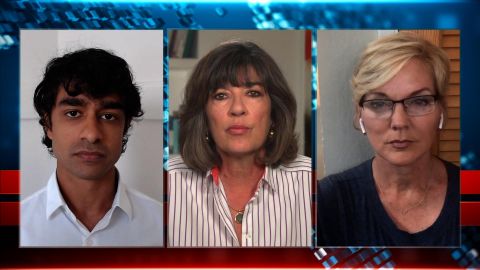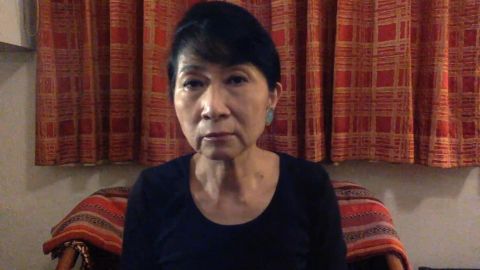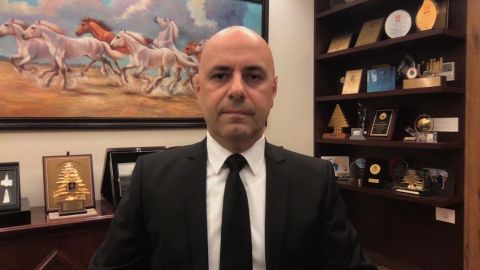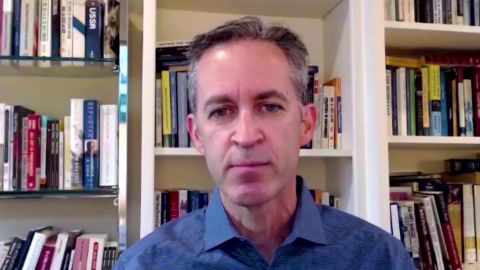Read Transcript EXPAND
CHRISTIANE AMANPOUR: Now, the House says — the White House says that it is deeply concerned about reports of irregularities in Belarus’ presidential elections. Tensions are at boiling point, as democracy protests their clash with police. The incumbent President Alexander Lukashenko apparently won a landslide 80 percent victory, securing a sixth term. But demonstrators say they have been cheated by a rigged election in that former Soviet state. Nicknamed Europe’s last dictator, Lukashenko has drawn international criticism for his suppression of dissent and his aggressive crackdown on journalists. Also, he did not take coronavirus seriously. Meanwhile, our next guest has made protecting freedom of speech his life’s work. David Kaye spent six years as a U.N. special rapporteur on the promotion and protection of the right to freedom of opinion and expression. Here is telling our Hari Sreenivasan why the coronavirus pandemic is the newest tactic in the authoritarian leadership playbook.
(BEGIN VIDEOTAPE)
HARI SREENIVASAN: Thanks, Christiane. David Kaye, thanks so much for joining us. What’s the U.S. contribution, or lack thereof, been to the state of how the freedom of expression and opinion exists in the world?
DAVID KAYE, FORMER U.N. SPECIAL RAPPORTEUR ON FREEDOM AND OPINION AND EXPRESSION: The United States is really seen in some respects as an outlier, as a zealous defender of freedom of expression, of free speech, of what we think of in the U.S. as First Amendment rights, prioritizing free speech issues over almost all other kinds of rights. That’s traditionally how people have seen the U.S. commitment. And the truth is, the United States has been a very active proponent of things such as Internet freedom, a free media. Through USAID and other funding mechanisms, the U.S. has supported independent media around the world. So, the United States has played a pretty important role, even set up the special rapporteur position that I held for six years. It set up over 25 years ago. So, the U.S. has played a very important role. It’s been increasingly absent under the Trump administration. But I think people still look to the kind of values that you can find in American law around free expression, particularly in First Amendment jurisprudence.
SREENIVASAN: What was the thing that you were most surprised by in your findings, that you perhaps didn’t expect at the levels that it was, and what is the sense of urgency around that finding?
KAYE: Yes, I mean, I think that there are a couple of different things. I think that your audience is probably quite aware of the fact that there’s been a rise in authoritarianism over the last several years. There’s been a rise in populist illiberalism around the world. And that has been focused very much on independent media. We have just seen this incredible rise of repression of independent voices around the world, and, by that, media outlets, but also human rights organizations, activists, and others. And I think the one surprising thing — or maybe two surprising things for me have been, one, there was this continued relevance of the voice of the United States. And I saw this early on. Even though there’s a lot of skepticism about the U.S. and the U.S. government worldwide, this was something that it was somewhat surprising to me that people still really like to hear the voice of American officials. And over the last few years, they have missed that. The other part of it is I think that, particularly in the United States, we tend to think of human rights and human rights law as being a kind of niche issue, almost paper that doesn’t have real impact for people’s lives. But it is the vocabulary that people use around the world to assert their rights. And I think that was — it was somewhat surprising to me, the way in which human rights law is actually used by people to make claims, and even in their own domestic environments against their own governments.
SREENIVASAN: Just recently, we had the State Department lay out what it wants as the equivalent of a clean Internet, so to speak, not necessarily the content online, but the way that information gets to you. They are asking for countries to sign on and say that they will not use routers and hardware from China, not the cables from China that might be laying undersea. What do you think that does to how the world perceives this flow of information?
KAYE: So, this is something that’s really quite new. ‘ Secretary of State Pompeo announced this clean Internet program. It’s very unclear how that program will be implemented. It’s unclear why it’s focused only on China. But when you step back and look at this program, at this agenda, at this agenda of saying to the world, we’re going to separate out our Internet from the Chinese Internet, it’s very dangerous. We’re already facing a situation where China, for many years, has had a firewall around its Internet. And that’s been a censorship machine, right? It’s designed to prevent Chinese people in China from receiving information. And the language in this latest initiative from the United States almost mimics the language of the Chinese firewall, even if it doesn’t look exactly the same, even if the agenda is not censorship. It is suggesting to the world, I think — and this is really the problematic part of it in principle — it is suggesting to the world that national security concerns can be a reason to limit freedom of expression, to limit the free flow of information, to limit communications. And other governments are going to be thrilled to hear this. This is something that China, that Russia, that many other countries will be really happy to know, oh, the United States thinks that using national security as a grounds to limit Internet access, for example, that that’s fine, and they will be happy. That is an authoritarian playbook, not an American one.
SREENIVASAN: I mean, we lose the moral high ground there. I mean, this is something that we have critiqued governments around the world for when they wanted a halal Internet in the Middle East or the great firewall that China has set up.
KAYE: It definitely seems like a geopolitical move, rather than a real move designed to protect the security and privacy of American citizens or people in the United States. But I think people will use this, governments around the world will use this to say, look, we have been saying the same thing for years, that we need a sovereign Internet. And this is — this is something the United States is doing. They’re the great defenders of freedom of expression and of Internet freedom. We should be able to do this as well.
SREENIVASAN: You wrote a book a while back, called the “Speech Police: The Global Struggle to Govern the Internet.” Are you concerned that, as we see, for example, China’s Belt and Road Initiative rolled out, one of the things that they are able to sell to the countries that are becoming partners is possibly a different version of the Internet than the one that people in the United States are used to?
KAYE: Yes, absolutely. And I think that it’s important for people to understand that the Chinese model, what they call a managed Internet, that that model is very, very attractive to governments around the world. It’s attractive to so many governments that want to control the narrative. I mean, we even see this in the United States, at least on the level of President Trump constantly calling out the media as the enemy of the people, that, even though he doesn’t really have all the power that a government like Egypt might have to attack journalists or to control the narrative or attack the media, he clearly wants to do that. And it reflects what many governments around the world want to do. And so, when you look at China’s interest in expanding its version of the Internet, I mean, one — one possibility — or at least expanding its version of control of the Internet — one possibility is that it will sell its technology, it will sell its firewall technology, its filtering technology and so forth, so that governments are able to do what it does in creating its own firewall. But there’s a broader problem also out there. And that is that China is — it’s a very savvy international actor. And it is really trying to change the way we think about freedom of expression. It’s trying to change the way that governments and the international organizations protect Internet rights. And it’s doing this by getting involved in the Human Rights Council, which the United States left two years ago. It had a seat on the Council and it withdrew from the Council for political reasons. China is saying, look, we’re going to engage you in these different forums, and we are going to say, this is what freedom of expression means, this is what online freedom means. And over time, if there isn’t a countervailing push from Democratic governments about saying, actually, the Internet is a place for the sharing of information, it should be open, it should be secure, but it’s a real place for open debate and sharing of information, as against the Chinese model, if we don’t do that, we’re going to see the splintering of the Internet, which we’re already seeing — we will see it splintering in a way that ultimately harms everybody’s ability to communicate with friends, to learn information, to look at — learn languages, to connect with communities around the world. It’s a very serious problem, when we think about the future of online freedom.
SREENIVASAN: In the United States, there’s this grand tension here between the private sector, the social platforms like Facebook and Twitter and Google, different companies, saying, hey, we’re not going to be the speech police. We’re just platforms. We actually want to encourage a freedom of expression. And yet that has posed some different types of societal concerns for us now.
KAYE: That’s absolutely true. And I think, again, anybody who is a consumer of the news today knows that the platforms, the American platforms, but also outside the United States, Chinese platforms like WeChat, or Russian platforms like VK, or some other platforms have enormous power over our public square, over the public space. And whether we think of the platforms themselves as the public space, or we think of them as just having a huge impact on public debate, they clearly have that impact. And whether they like it or not, they are absolutely are making decisions about what is acceptable to say in public these days, right. They have standards, they have rules that determine what you can post, what you can tweet, what you can like, all of those different things. They have enormous power right now.
SREENIVASAN: So, how should companies deal with trying to monitor and suppress disinformation and misinformation on their platforms, but still enable a place where people can have a free and fair exchange of ideas?
KAYE: Yes, this is this is a fundamental problem right now. A colleague of mine in the Netherlands talks about the way the algorithms work, as suggesting that hate is a part of the business model of the companies, right, because that kind of provocative content gets shared widely. And we don’t know why it gets shared that way. So, at the very kind of big level of understanding how information spreads on the platforms, we have very little insight. And that’s because the companies are quite opaque about their algorithms, about their artificial intelligence that allows information to travel online. So, this is a very significant problem for us as citizens. It’s a very significant problem for us as really trying to understand why disinformation travels so quickly around the Internet. And I think there’s there’s definitely room here for governments to start to regulate in this space. Now, that doesn’t mean regulation that involves telling the companies, this is what your algorithm should look like. But they should be regulating at the very least transparency around the algorithms, so that we on the outside can evaluate why it is that a hateful video or a video on YouTube that is inciting violence against a community somewhere in the world, why is that so popular?
SREENIVASAN: You have been looking at this for a number of years. And just around the time that you’re wrapping up, here comes a global pandemic. What did the pandemic do to all of the challenges about freedom of expression that you have been cataloguing?
KAYE: Yes, the pandemic has kind of focused the attention of the platforms and of the public on things that, frankly, academics, experts, and the platforms themselves have been thinking about for many years, so disinformation, for example. Since, at least 2016, but even before then, there’s been concern among the public and among the platforms and governments, to a certain extent, around disinformation, disinformation that typically is political and so forth. And it’s been hard for companies and governments to understand what to do about it, because they see it as political information. And they don’t want to — for good reasons, they don’t want to interfere with political debate. And so — and this is where this phrase that Zuckerberg has mentioned, we don’t want to be the arbiters of truth, that’s where that comes up, right, because we don’t want to decide, they’re saying, between the truth of a political claim and the untruth. The pandemic has really focused everybody’s attention on, still, it’s disinformation, but this is disinformation around the disease, around drugs that might be useful or not against the disease, against vaccines that might be useful or might be in development. And now the companies see, actually, disinformation that travels around our platforms can actually harm people. It could result in death. It could result in the increase of the spread of the outbreak. And so I think what we have seen is, the companies are pretty aggressive when it comes to pandemic disinformation, going so far as to take down, as Twitter did very recently and Facebook did, take down Trump campaign posts around drug use and other things around the pandemic. But it’s also, I think, probably going to have a longer-term impact on the way the platforms and the way governments see the possibility of regulating disinformation.
SREENIVASAN: You have even accused the White House of what you called an onslaught against press freedoms. The Trump effect is what you called it. What does that mean?
KAYE: Well, clearly, over the last several years, President Trump has denigrated the press. There have been instances of attack over the last several months, particularly in the context of Black Lives Matter protests, where journalists have been attacked directly by the police. They have been detained by the police, even when they’re clearly identifying themselves and identifiable to the police as journalists. And I think that you can’t — you can’t disconnect that from Trump’s rhetoric, from the kinds of attacks that the administration has imposed on journalists. They’re — we’re still lucky in the United States that we do have a robust, independent media. We are, in fact, in a kind of golden age of investigative reporting. There are great reporters out there who are pushing back against this. And I think the public, by and large, recognizes the importance of having an independent media as a tool to check government. But the Trump administration is pushing hard. Governments around the world see this, and they’re happy that — yes, at least authoritarian governments are happy that the United States is acting this way, because it really gives them the opening to say, look, when we attack journalists who are covering protests, we’re not doing anything different than the United States is doing.
SREENIVASAN: David Kaye, thanks so much for joining us.
KAYE: All right, thanks so much for having me.
About This Episode EXPAND
Christiane speaks with former Lebanese Deputy Prime Minister Ghassan Hasbani and Hong Kong pro-democracy Legislative Council member Claudia Mo. She also speaks with former Governor of Michigan Jennifer Granholm and Fmr. Chief of Staff for Alexandria Ocasio-Cortez Saikat Chakrabarti. Hari Sreenivasan speaks with David Kaye, Former U.N. Special Rapporteur on Freedom of Opinion and Expression.
LEARN MORE



